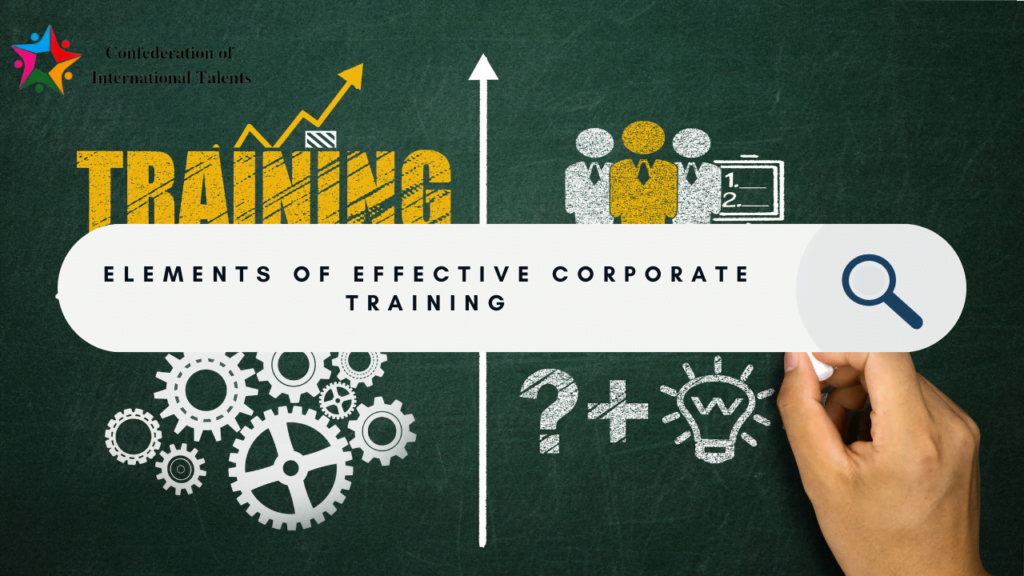Did you know that companies that offer comprehensive training programs enjoy a 24% higher profit margin than those that don’t invest in employee development? Corporate training is a strategic investment that can drive organizations toward success. But what are the Essential components of an effective Corporate training program ? Let’s look into this essential topic really important for designing and implementing successful training programs.
What is Corporate Training
Corporate training refers to the structured process of enhancing employees’ knowledge, skills, and competencies within an organization. The purpose is to provide individuals with the knowledge and tools they need to perform their roles effectively, adapt to industry changes, and also contribute to the overall success of the organization. Corporate training programs cover a wide range of subjects, including technical skills, leadership management, compliance training, soft skills enhancement, and more.

Why Effective Corporate Training
Effective corporate training programs are essential for various reasons:
1. Skill Enhancement:
Corporate training helps employees develop new skills and refine existing ones so that they can meet the changing needs of job requirements.
2. Employee Engagement:
Training programs motivate employees, improve job satisfaction, and reduce turnover rates because they make them feel important to the organization.
3. Competitive Advantage:
Providing regular training makes the employees well-trained and they ultimately contribute to the organization’s competitive edge by staying relevant and efficient in their field.
4. Innovation:
Training develops an innovative mindset and culture because it makes employees think creatively and solve problems effectively.
Essential Components of an Effective Corporate Training Program
1. Training Needs Analysis:
A corporate training program’s first important component is conducting a thorough assessment to identify organizational and individual training needs. For instance, a sales team might require training in effective communication skills to enhance customer interactions. Organizations must evaluate training needs on a regular basis.
2. Clear Learning Goals:
Clear learning goals in a corporate training program are required because they define what participants should know, understand, or be able to do by the end of the training. These goals provide direction and purpose, guiding the design, delivery, and assessment of the training. Also, the goal should have specific learning outcomes that align with organizational goals.
For example, a customer service training program might aim to improve response times and customer satisfaction ratings.
3. Training Styles and Models:
Incorporating diverse training styles such as visual, auditory, kinesthetic, and interactive methods along with established training models like the ADDIE (Analysis, Design, Development, Implementation, Evaluation) model or the Kirkpatrick Model can enhance engagement and facilitate a more comprehensive learning experience.
4. Effective Training Materials:
The training Material shall be developed as interactive and engaging such as videos, interactive modules, and real-world case studies. This makes highly learning effective.
For instance, an IT training program could include simulation exercises for troubleshooting common issues.
5. Experienced Trainer:
The trainer shall be knowledgeable and experienced in delivering training sessions. He must know the teaching pattern so that every employee can grasp the subject for better outcomes.
A leadership development program may benefit from industry experts sharing real-world insights and best practices.
6. Feedback and Assessment:
Feedback surveys, quizzes, and assessments are equally important to measure learning outcomes and gather insights into both participants and training and ultimately lead to program improvement.
For example, a compliance training program could include regular quizzes to reinforce key concepts.
7. Technology Integration:
Technology shall be utilized for training delivery, incorporating e-learning platforms, virtual classrooms, and online resources. An onboarding program could utilize virtual reality simulations to familiarize new hires with workplace environments.
8. Support and Mentoring:
Organizations should provide ongoing support through mentoring programs and coaching sessions. A diversity and inclusion training initiative might pair employees with mentors to guide challenging topics and promote inclusive work environments.
9. Recognition and Rewards:
A system of reward and recognition for employees who demonstrate exceptional performance and dedication during training must be a part of the training framework. A sales training program could acknowledge top performers with bonuses or incentives to boost motivation.
10. Continuous Improvement:
Improving the training program as and when required is also necessary. This includes regular evaluation of training programs, gathering feedback, and making necessary adjustments to increase effectiveness. For example: A cybersecurity training program might evolve based on emerging threats and industry trends to ensure relevancy.
11. Measurement of ROI:
For measuring a successful training program it is essential to track the return on investment (ROI) of training programs by analyzing key performance metrics such as improved sales figures, reduced error rates, or enhanced customer satisfaction scores.
The success of a corporate training program basically depends on its strategic design and execution. By incorporating these key components into training initiatives, organizations can develop an effective corporate training program that helps employees excel in their roles and drive business growth. Effective corporate training not only provides employees with the necessary skills but also cultivates a collective and innovative work environment consequently placing the organization for sustainable success.
The Confederation of International Talents (CIT) is one of the best institutes in Mauritius providing effective corporate training programs. For more information, you can contact CIT!
